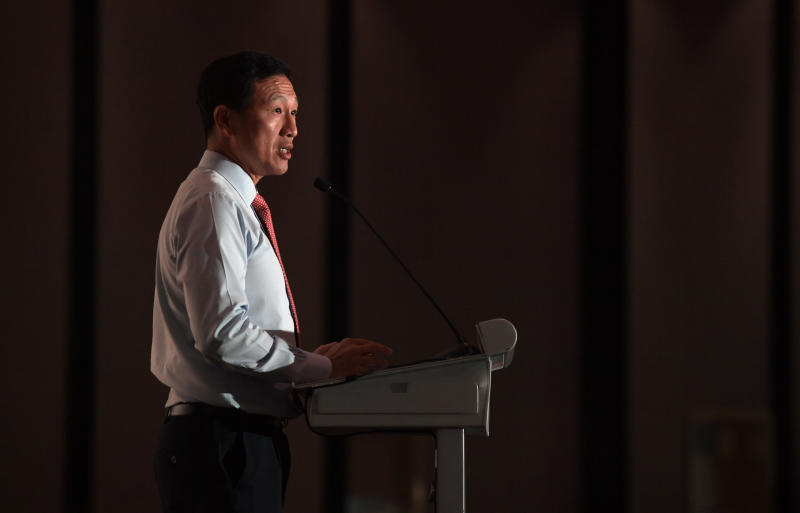Setting long-term goals and achieving them is one of Singapore's greatest strengths: Ong Ye Kung
Sign up now: Get ST's newsletters delivered to your inbox

In a photo taken on Sept 5, Minister for Education Ong Ye Kung is seen speaking at an awards ceremony at the Fairmont Ballroom.
ST PHOTO: ALPHONSUS CHERN
Follow topic:
SINGAPORE - Singaporeans take a long-term view and expect the Government to not only understand the trends, challenges and opportunities of the future, but also take the necessary actions now.
Speaking at the Singapore Institute of Directors annual conference on Wednesday (Sept 11), Education Minister Ong Ye Kung said that this ability to set long-term goals and achieve them has been one of Singapore's greatest strengths.
The main criticism of democracy today, he noted, is that it is driven by short-term considerations.
But whether a government has a short-term or long-term view depends on what people care about.
"If people have hopes for the future, if people want a government that thinks for their children and the future generation, it will be a democracy that instils the discipline of governmental far-sightedness.
"Fortunately, this is what Singapore has, and it is one of our greatest advantages," he said.
This long-term approach was how Singapore built up its public housing programme and the Singapore Armed Forces.
"Likewise, it is why we are now reforming the education system... and starting to tackle climate change and rising sea levels," he noted.
"This is a long-term, 20- to 30-year problem, but we have to tackle it now. People expect the Government to do so."
Addressing more than 800 participants at the conference held at the Suntec Singapore Convention and Exhibition Centre, Mr Ong drew parallels between good governance for a company and for a government.
He said there is a need for a good balance between growth and improving the lives of all stakeholders, adding that there are some signposts to tell if a right balance is being struck.
These include how success is defined, the level of dynamism and innovation, the presence of a far-sighted approach, and the ability to engage stakeholders.
He said there is more than a single measure of success.
"Life is not so simple that it can be boiled down to one number and all we need to do is chase that number relentlessly... It is like telling students that the only thing that matters in their childhood is their examination results and nothing else.
"The poor child will have no childhood," he said.
A well-governed country - like a far-sighted company - must evaluate its success in ways that are relevant to different stakeholders.
Failure to do so, such as the blind pursuit of profits at the expense of the environment or the poorer segments of society, could lead to public indignation, he added.
In his speech, Mr Ong noted that about 200 American chief executives caused some excitement when they pledged to serve not just shareholders, but also a broader slate of stakeholders.
He said that engaging stakeholders is just as important for a government.
He singled out Singapore's model of tripartism - the three-way partnership between unions, employers and the Government - as an important institutionalised concept of stakeholder engagement in Singapore.
"Engagement has become an integral part of governance in Singapore," he said.
He added: "There are no short cuts to good governance, only a ceaseless... journey to bring all stakeholders together, earn their trust, and work with them to build a brighter future... for (the) country."
The conference featured more than 30 speakers, who shared their views on transformational leadership and the future of work.

